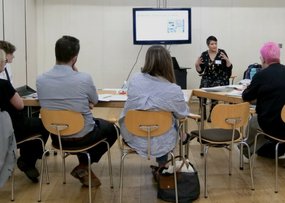
Discover how St Thomas More Catholic High School prioritised disciplinary literacy practice to develop and embed high-quality subject-specific literacy and benefit student academic progress.
Research and rationale
In their Improving Literacy in Secondary Schools recommendations, the Education Endowent Foundation (EEF) describes disiplinary literacy as
"...an approach to improving literacy across the curriculum. It recognises that literacy skills are both general and subject specific, emphasising the value of supporting teachers in every subject to teach students how to read, write and communicate effectively in their subjects."
The National Literacy Trust's Literacy for Learning approach provides professional development and training to secondary teachers to mobilise the effective teaching of literacy within their subjects, as a key lever to improving educational outcomes for all students.
Teacher feedback in evaluation of Literacy for Learning identified that the training they received on subject-specific disciplinary literacy had improved their confidence and understanding to put into practice what they had learnt. This drove a noted improvement in attitudes to literacy as students saw how it was relevant in different subjects.
Inspiring practice
A guiding beacon for developing whole-school disciplinary literacy practice is St Thomas More Catholic High School, North Shields. The school is a long-standing National Literacy Trust premium member, and participant in our secondary CPD training.
Identifying that literacy across the curriculum was little understood and sparsely practised, Clare Feeney, Teaching and Learning Lead at the school, garnered support of key colleagues to ensure it was prioritised on their school development plan. This initiated a journey of collective action that encompassed strategic planning, staff training and practical teaching activities.
From explicit vocabulary teaching, active reading strategies, and modelled written answers, the school rolled out training in a range of methods to embed great literacy practice that was relevant within each subject area. Find out more by downloading the full case study in the files section below.
Download file
You might also be interested in
-
Premium
Support secondary students’ success with practical, research-informed strategies to build vocabulary across the curriculum.View details about Developing vocabulary in secondary schools -
Premium
A compilation of recent research and policy developments to support whole-school and disciplinary literacy in secondary schools.View details about Secondary School Literacy Research and Policy Guide -
Free
Supporting schools and early years settings with literacy teaching resources to help enrich your lessons linking to literacy moments and awareness days throughout the academic year.View details about Literacy teaching and school events calendar 2025-2026


